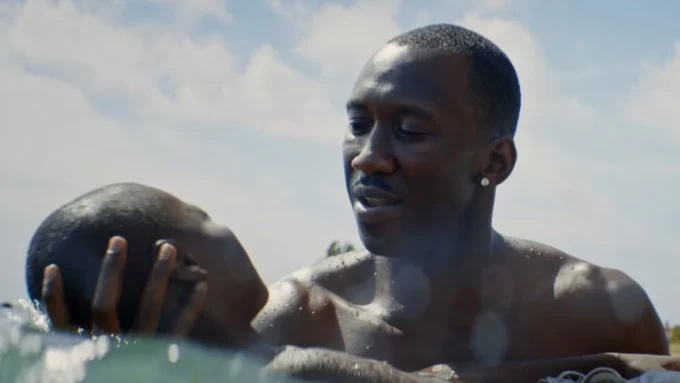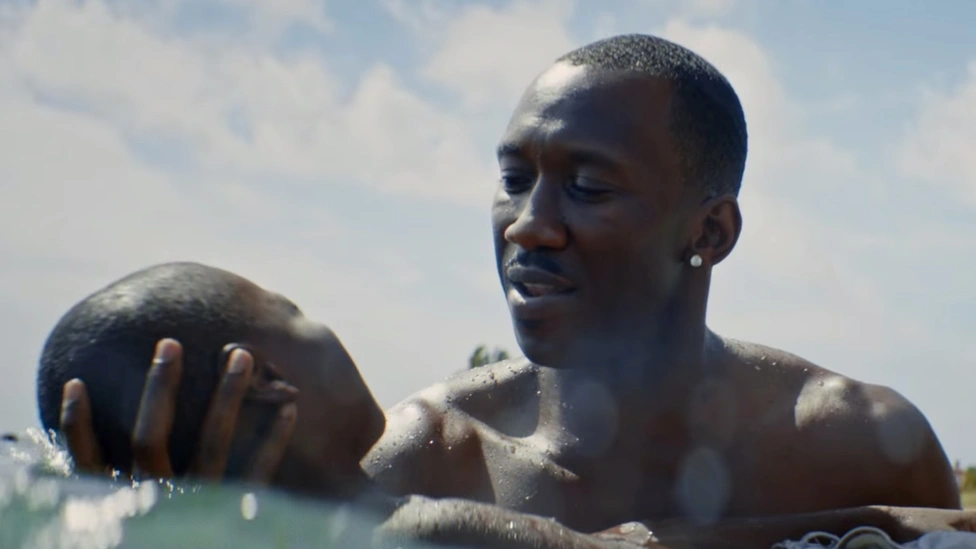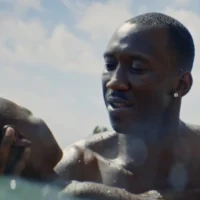


































































Still from Moonlight. (A24)
An American friend visiting London last week asked me to recommend some “movies” to him. Only later did I realise how loaded a question it was. Cinema has always been a mirror—sometimes polished, sometimes cracked—held up to the culture that produces it. American films, and the rest-of-the-world epics reflected on US screens, don’t just entertain; they heighten romance, corruption, resistance, bewilderment, and hope. Looking again at the United States today after my friend returned to New York—the fractured politics, social unrest, ICE fury, climate dread, and yet a stubborn yearning for reinvention—I saw not policy headlines but fragments of its history shimmering through “movies” I hadn’t even named, ones he would have seen anyway, from Hollywood’s golden age to its more unsettled visions.
As an old sheep farmer friend from Northumberland reminded me, one need only hear Humphrey Bogart murmur to Ingrid Bergman in Casablanca (1942), “We’ll always have Paris,” to sense the bittersweet nostalgia America clings to in times of uncertainty. The film’s smoky interiors—watched by millions again recently on the BBC—perfectly capture a nation perched on the edge of global conflict, trying to summon courage and moral clarity. Today, in a world riven by authoritarianism, Rick’s Café feels like Washington, D.C. itself: half cynicism, half desperate hope. Very different from the city I knew before Trump, and different again from the one I imagine now.
Two decades later, the sweep of David Lean’s Lawrence of Arabia (1962)—a British story but unmistakably a Hollywood production—offers another metaphor for American ambition. The desert, stretched in vast golden silence, becomes a screen for hubris. Peter O’Toole’s Lawrence, though British, whispers, “Nothing is written.” That immortal line, shimmering against the horizon near Jordan’s Wadi Rum, resonates with America’s self-image as a country forever rewriting its destiny. Yet Lawrence’s descent into violence anticipates the United States’ own entanglements in the Middle East and beyond. The film’s dazzling beauty—camels cresting dunes against the burning sun—mirrors both awe at America’s scope and fear of its futility.
If Lawrence of Arabia is grandeur, The Godfather (1972) is intimacy darkened by betrayal. When Michael Corleone closes the office door on Kay’s stricken face, we feel the cold consolidation of power—family loyalty curdled into autocracy. “I’m with you now,” he lies, as the door swings shut. It is impossible not to see American politics in that gesture: smooth public assurances masking ruthless calculation.
If The Godfather is shadowed intimacy, Jonathan Demme’s Something Wild (1986) is tonal whiplash. What begins as screwball comedy—Melanie Griffith’s Lulu kidnapping Jeff Daniels from his corporate cage, the open road gleaming with possibility—turns suddenly violent when Ray Liotta appears with switchblade menace. The film jumps from liberation to dread, its volatility soundtracked brilliantly by the Mahotella Queens and Big Audio Dynamite. It feels quintessentially American: optimism one moment, rupture the next.
Spike Lee’s Do the Right Thing (1989) captures the same volatility, but under a punishing Brooklyn sun. “That’s the truth, Ruth,” voices shout, but whose truth? Radio Raheem’s death shatters the fragile equilibrium, just as today’s protests and debates about justice fracture the American stage. The film’s blazing reds and neon signs evoke the country’s energy and diversity, but also its unrelieved heat of rage. Watching it now, it’s impossible not to think of the summer of 2020, when George Floyd’s murder reignited protests across all fifty states—a reminder that Lee’s block remains America’s unfinished street.
Francis Ford Coppola’s Apocalypse Now (1979) is an even more fevered mirror. The jungle glows in hallucinatory greens, helicopters supplied by Marcos’s government in the Philippines roar to Wagner, and Captain Willard confesses, “Horror has a face.” In an age of endless wars, climate devastation, and disinformation, Coppola’s Conradian river journey feels prophetic. The surreal beauty of napalm flames at dawn recalls today’s images of burning forests and collapsing cities, where awe and dread mingle uneasily. Its descent also shadows America’s two decades in Afghanistan, ending not with triumph but with a chaotic withdrawal—another river journey with no clear destination, haunted by the same “horror” Willard names.
More recently, Barry Jenkins’s Moonlight (2016) whispers a different kind of truth. Its Miami skies and ocean horizons carry the weight of tenderness and survival. When Chiron rests his head on Kevin’s shoulder, the silence speaks louder than a thousand speeches: a fractured America still capable of intimacy and grace.
And then Paul Thomas Anderson’s There Will Be Blood (2007). Daniel Plainview, face blackened by oil, snarls: “I have a competition in me. I want no one else to succeed.” Few lines better capture America’s climate of winner-take-all economics and political greed. His derrick-streaked landscapes are scorched-earth politics, mirrored today in battles over fracking, pipelines, and climate bills where fossil-fuel power still distorts the terrain as ruthlessly as any oil baron. The final mutter—“I’m finished”—feels like a private elegy for a country non-Americans fear is now devouring itself.
From Casablanca to Moonlight, cinema has probably always given us a kaleidoscope of America’s soul. Bogart’s farewell, Lawrence’s dunes, Michael’s door, Lulu’s road trip, Radio Raheem’s boombox, Willard’s horror, Chiron’s embrace, Plainview’s greed (just listing them all is exhausting)—these are not just history but ongoing reflections of who America is and who it might yet become.
Bong Joon-ho’s Parasite (2019) shows not only Seoul but Los Angeles or New York in its polished glass mansion and flood-soaked basement. “It’s so metaphorical,” Ki-woo jokes, but the Park family’s brittle luxury mirrors America’s own gated enclaves, built on invisible labour. Their house could just as easily stand in Austin or Los Angeles, where housing costs soar and tent encampments grow—a reminder that America’s class divides are every bit as stark.
Alfonso Cuarón’s Children of Men (2006), though British, feels urgently American. Refugee camps, border crises, authoritarian temptation—all play out in long, bloody takes. When soldiers lower their guns at the cry of a newborn, it is a moment of cinematic grace: a reminder of what remains sacred even in collapse.
Jean-Luc Godard’s Weekend (1967) also speaks anew. Its endless traffic jams, horns blaring like a mechanical chorus, feel like America’s own climate gridlock: highways of SUVs stretching into the horizon against a backdrop of wildfire.
Together, these global visions enlarge the American mirror. Parasite’s class warfare, Children of Men’s refugee terror, Weekend’s surreal collapse—all resonate with American dilemmas. They remind us that the nation’s story is not isolated but braided into the world’s wider anxieties over inequality, loss, and survival.
In the end, what cinema offers is not certainty but light—flickering, fragile, and sometimes blinding. The screen does not solve America’s crises any more than it solved Lawrence’s desert battles or Michael Corleone’s betrayals. But it does what no congressional debate or policy paper can: it captures the emotional weather of a people at once fearful and hopeful, exhausted and inventive. To watch Casablanca beside Parasite, or Apocalypse Now beside Moonlight, is to see not only a country but a planet wrestling with its own unfinished script. And perhaps that is the final gift of cinema: to remind us that “nothing is written,” and that even in our darkest reels, the possibility of a different ending still flickers on the horizon. Any list I gave my American friend, I realise now, was always bound to pale beside the truths already glowing in the dark.
The post Autocracy, Apocalypse and the Blue Glow: The State of America in Film appeared first on CounterPunch.org.
This content originally appeared on CounterPunch.org and was authored by Peter Bach.